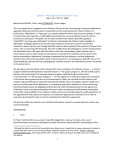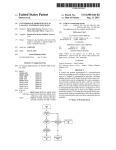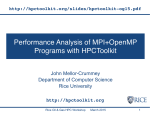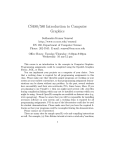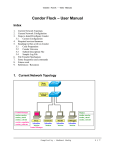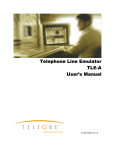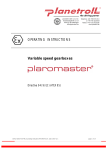Download Specht-1 SPECHT v. NETSCAPE COMMUNICATIONS CORP. 306 F
Transcript
SPECHT v. NETSCAPE COMMUNICATIONS CORP. 306 F.3d 17 (2d Cir. 2002) SOTOMAYOR, Circuit Judge. This is an appeal from a judgment of the Southern District of New York denying a motion by defendants-appellants Netscape Communications Corporation and its corporate parent, America Online, Inc. (collectively, “defendants” or “Netscape”), to compel arbitration and to stay court proceedings. In order to resolve the central question of arbitrability presented here, we must address issues of contract formation in cyberspace. Principally, we are asked to determine whether plaintiffs ..., by acting upon defendants’ invitation to download free software made available on defendants’ webpage, agreed to be bound by the software’s license terms (which included the arbitration clause at issue), even though plaintiffs could not have learned of the existence of those terms unless, prior to executing the download, they had scrolled down the webpage to a screen located below the download button. We agree with the district court that a reasonably prudent Internet user in circumstances such as these would not have known or learned of the existence of the license terms before responding to defendants’ invitation to download the free software, and that defendants therefore did not provide reasonable notice of the license terms. In consequence, plaintiffs’ bare act of downloading the software did not unambiguously manifest assent to the arbitration provision contained in the license terms. We also agree with the district court that plaintiffs’ claims relating to the software at issue – a “plug-in” program entitled SmartDownload (“SmartDownload” or “the plug-in program”), offered by Netscape to enhance the functioning of the separate browser program called Netscape Communicator (“Communicator” or “the browser program”) – are not subject to an arbitration agreement contained in the license terms governing the use of Communicator.... We therefore affirm the district court’s denial of defendants’ motion to compel arbitration and to stay court proceedings. BACKGROUND I. Facts In three related ... actions, plaintiffs alleged that, unknown to them, their use of SmartDownload transmitted to defendants private information about plaintiffs’ downloading of files from the Internet, thereby effecting an electronic surveillance of their online activities in violation of two federal statutes, the Electronic Communications Privacy Act, 18 U.S.C. §§ 2510 et seq., and the Computer Fraud and Abuse Act, 18 U.S.C. § 1030. Specifically, plaintiffs alleged that when they first used Netscape’s Communicator – a software program that permits Internet browsing – the program created and stored on each of their computer hard drives a small text file known as a “cookie” that functioned “as a kind of electronic identification tag for future communications” between their computers and Netscape. Plaintiffs further alleged that when they installed SmartDownload – a separate software “plugSpecht-1 in” that served to enhance Communicator’s browsing capabilities – SmartDownload created and stored on their computer hard drives another string of characters, known as a “Key,” which similarly functioned as an identification tag in future communications with Netscape. According to the complaints in this case, each time a computer user employed Communicator to download a file from the Internet, SmartDownload “assume[d] from Communicator the task of downloading” the file and transmitted to Netscape the address of the file being downloaded together with the cookie created by Communicator and the Key created by SmartDownload. These processes, plaintiffs claim, constituted unlawful “eavesdropping” on users of Netscape’s software products as well as on Internet websites from which users employing SmartDownload downloaded files. In the time period relevant to this litigation, Netscape offered on its website various software programs, including Communicator and SmartDownload, which visitors to the site were invited to obtain free of charge.... [F]ive of the ... plaintiffs ... downloaded Communicator from the Netscape website. These plaintiffs acknowledge that when they proceeded to initiate installation of Communicator, they were automatically shown a scrollable text of that program’s license agreement and were not permitted to complete the installation until they had clicked on a “Yes” button to indicate that they accepted all the license terms.4 If a user attempted to install Communicator without clicking “Yes,” the installation would be aborted. All five ... expressly agreed to Communicator’s license terms by clicking “Yes.” The Communicator license agreement ... made no mention of SmartDownload or other plug-in programs, and stated that “[t]hese terms apply to Netscape Communicator and Netscape Navigator”6 and that “all disputes relating to this Agreement (excepting any dispute relating to intellectual property rights)” are subject to “binding arbitration in Santa Clara County, California.” Although Communicator could be obtained independently of SmartDownload, all the named user plaintiffs, except Fagan, downloaded and installed Communicator in connection with downloading SmartDownload. Each of these plaintiffs allegedly arrived at a Netscape webpage captioned “SmartDownload Communicator” that urged them to “Download With Confidence Using SmartDownload!” At or near the bottom of the screen facing plaintiffs was the prompt “Start Download” and a tinted button labeled “Download.” By clicking on the button, plaintiffs initiated the download of SmartDownload. Once that process was complete, SmartDownload, as 4 This kind of online software license agreement has come to be known as “clickwrap” (by analogy to “shrinkwrap,” used in the licensing of tangible forms of software sold in packages) because it “presents the user with a message on his or her computer screen, requiring that the user manifest his or her assent to the terms of the license agreement by clicking on an icon. The product cannot be obtained or used unless and until the icon is clicked.” Specht, 150 F. Supp. 2d at 593-94 (footnote omitted). Just as breaking the shrinkwrap seal and using the enclosed computer program after encountering notice of the existence of governing license terms has been deemed by some courts to constitute assent to those terms in the context of tangible software, see, e.g., ProCD, Inc. v. Zeidenberg, 86 F.3d 1447, 1451 (7th Cir. 1996), so clicking on a webpage’s clickwrap button after receiving notice of the existence of license terms has been held by some courts to manifest an Internet user’s assent to terms governing the use of downloadable intangible software, see, e.g., Hotmail Corp. v. Van$ Money Pie Inc., 47 U.S.P.Q.2d 1020, 1025 (N.D. Cal. 1998). 6 While Navigator was Netscape’s “stand-alone” Internet browser program during the period in question, Communicator was a “software suite” that comprised Navigator and other software products.... Specht-2 its first plug-in task, permitted plaintiffs to proceed with downloading and installing Communicator, an operation that was accompanied by the clickwrap display of Communicator’s license terms described above. The signal difference between downloading Communicator and downloading SmartDownload was that no clickwrap presentation accompanied the latter operation. Instead, once plaintiffs Gibson, Gruber, Kelly, and Weindorf had clicked on the “Download” button located at or near the bottom of their screen, and the downloading of SmartDownload was complete, these plaintiffs encountered no further information about the plug-in program or the existence of license terms governing its use. The sole reference to SmartDownload’s license terms on the “SmartDownload Communicator” webpage was located in text that would have become visible to plaintiffs only if they had scrolled down to the next screen. Had plaintiffs scrolled down instead of acting on defendants’ invitation to click on the “Download” button, they would have encountered the following invitation: “Please review and agree to the terms of the Netscape SmartDownload software license agreement before downloading and using the software.” Plaintiffs Gibson, Gruber, Kelly, and Weindorf averred in their affidavits that they never saw this reference to the SmartDownload license agreement when they clicked on the “Download” button. They also testified during depositions that they saw no reference to license terms when they clicked to download SmartDownload, although under questioning by defendants’ counsel, some plaintiffs added that they could not “remember” or be “sure” whether the screen shots of the SmartDownload page attached to their affidavits reflected precisely what they had seen on their computer screens when they downloaded SmartDownload. In sum, plaintiffs allege that[, ... h]aving selected SmartDownload, they were required neither to express unambiguous assent to that program’s license agreement nor even to view the license terms or become aware of their existence before proceeding with the invited download of the free plug-in program. Moreover, once these plaintiffs had initiated the download, the existence of SmartDownload’s license terms was not mentioned while the software was running or at any later point in plaintiffs’ experience of the product. Even for a user who, unlike plaintiffs, did happen to scroll down past the download button, SmartDownload’s license terms would not have been immediately displayed in the manner of Communicator’s clickwrapped terms. Instead, if such a user had seen the notice of SmartDownload’s terms and then clicked on the underlined invitation to review and agree to the terms, a hypertext link would have taken the user to a separate webpage entitled “License & Support Agreements.” The first paragraph on this page read, in pertinent part: The use of each Netscape software product is governed by a license agreement. You must read and agree to the license agreement terms BEFORE acquiring a product. Please click on the appropriate link below to review the current license agreement for the product of interest to you before acquisition. For products available for download, you must read and agree to the license agreement terms BEFORE you install the software. If you do not agree to the license terms, do not download, install or use the software. Specht-3 Below this paragraph appeared a list of license agreements, the first of which was “License Agreement for Netscape Navigator and Netscape Communicator Product Family (Netscape Navigator, Netscape Communicator and Netscape SmartDownload).” If the user clicked on that link, he or she would be taken to yet another webpage that contained the full text of a license agreement that was identical in every respect to the Communicator license agreement except that it stated that its “terms apply to Netscape Communicator, Netscape Navigator, and Netscape SmartDownload.” The license agreement granted the user a nonexclusive license to use and reproduce the software, subject to certain terms: BY CLICKING THE ACCEPTANCE BUTTON OR INSTALLING OR USING NETSCAPE COMMUNICATOR, NETSCAPE NAVIGATOR, OR NETSCAPE SMARTDOWNLOAD SOFTWARE (THE “PRODUCT”), THE INDIVIDUAL OR ENTITY LICENSING THE PRODUCT (“LICENSEE”) IS CONSENTING TO BE BOUND BY AND IS BECOMING A PARTY TO THIS AGREEMENT. IF LICENSEE DOES NOT AGREE TO ALL OF THE TERMS OF THIS AGREEMENT, THE BUTTON INDICATING NON-ACCEPTANCE MUST BE SELECTED, AND LICENSEE MUST NOT INSTALL OR USE THE SOFTWARE. Among the license terms was a provision requiring virtually all disputes relating to the agreement to be submitted to ... “final and binding arbitration in Santa Clara County, California, under the auspices of JAMS/EndDispute, with the losing party paying all costs of arbitration.” Unlike th[ose] plaintiffs who downloaded SmartDownload from the Netscape website, ... Michael Fagan[] claims to have downloaded the plug-in program from a “shareware” website operated by ZDNet, an entity unrelated to Netscape.... The pages that a user would have seen while downloading SmartDownload from ZDNet differed from those that he or she would have encountered while downloading SmartDownload from the Netscape website. Notably, instead of any kind of notice of the SmartDownload license agreement, the ZDNet pages offered only a hypertext link to “more information” about SmartDownload, which, if clicked on, took the user to a Netscape webpage that, in turn, contained a link to the license agreement. Thus, a visitor to the ZDNet website could have obtained SmartDownload ... without ever seeing a reference to that program’s license terms, even if he or she had scrolled through all of ZDNet’s webpages. .... II. Proceedings Below In the district court, defendants moved to compel arbitration and to stay court proceedings ..., arguing that the disputes reflected in the complaints, like any other dispute relating to the SmartDownload license agreement, are subject to the arbitration clause contained in that agreement. Finding that Netscape’s webpage, unlike typical examples of clickwrap, neither adequately alerted users to the existence of SmartDownload’s license terms nor required users unambiguously to manifest assent to those terms as a condition of downloading the product, the court held that the user plaintiffs had not entered into the SmartDownload license agreement. Specht, 150 F. Supp. 2d at 595-96. Specht-4 The district court also ruled that the separate license agreement governing use of Communicator, even though the user plaintiffs had assented to its terms, involved an independent transaction that made no mention of SmartDownload and so did not bind plaintiffs to arbitrate their claims relating to SmartDownload. Id. at 596. The court further concluded that Fagan could not be bound by the SmartDownload license agreement, because the shareware site from which he allegedly obtained the plug-in program provided even less notice of SmartDownload’s license terms than did Netscape’s page. Id. at 596-97.... Defendants took this timely appeal ..., and the district court stayed all proceedings in the underlying cases pending resolution of the appeal.... DISCUSSION I. Standard of Review and Applicable Law .... The FAA provides that a “written provision in any ... contract evidencing a transaction involving commerce to settle by arbitration a controversy thereafter arising out of such contract or transaction ... shall be valid, irrevocable, and enforceable, save upon such grounds as exist at law or in equity for the revocation of any contract.”11 9 U.S.C. § 2.... “[A]rbitration is a matter of contract and a party cannot be required to submit to arbitration any dispute which he has not agreed so to submit.” AT & T Techs., Inc. v. Communications Workers of Am., 475 U.S. 643, 648 (1986) (quotation marks omitted). Unless the parties clearly provide otherwise, “the question of arbitrability – whether a[n] ... agreement creates a duty for the parties to arbitrate the particular grievance – is undeniably an issue for judicial determination.” Id. at 649. ... [S]tate law governs the question of whether the parties in the present case entered into an agreement to arbitrate disputes relating to the SmartDownload license agreement.... II. Whether This Court Should Remand for a Trial on Contract Formation Defendants argue ... that the district court erred in deciding the question of contract formation as a matter of law... [A]ccording to defendants, “a trial on the factual issues that Defendants raised about each and every Plaintiffs’ [sic] downloading experience” is required on remand to remedy the district court’s “error” in denying defendants’ motion as a matter of law. .... We conclude for two reasons, however, that defendants are not entitled to a remand for a full trial. First, during oral argument in the district court on the arbitrability of the five user plaintiffs’ claims, defendants’ counsel repeatedly insisted that the district court could decide “as 11 The parties do not dispute ... that the agreement is a “written provision” despite being provided to users in a downloadable electronic form. The latter point has been settled by the Electronic Signatures in Global and National Commerce Act ... (codified at 15 U.S.C. §§ 7001 et seq.), which provides that “a signature, contract, or other record relating to such transaction may not be denied legal effect, validity, or enforceability solely because it is in electronic form.” Id. § 7001(a)(1); see also CAL. CIV. CODE § 1633.7(b) (“A contract may not be denied legal effect or enforceability solely because an electronic record was used in its formation.”). Specht-5 a matter of law based on the uncontroverted facts in this case” whether “a reasonably prudent person could or should have known of the [license] terms by which acceptance would be signified.” .... Accordingly, the district court decided the issue of reasonable notice and objective manifestation of assent as a matter of law.... Second, after conducting weeks of discovery on defendants’ motion to compel arbitration, the parties placed before the district court an ample record consisting of affidavits and extensive deposition testimony by each named plaintiff; numerous declarations by counsel and witnesses for the parties; dozens of exhibits, including computer screen shots and other visual evidence concerning the user plaintiffs’ experience of the Netscape webpage; oral argument supplemented by a computer demonstration; and additional briefs following oral argument. This well-developed record contrasts sharply with the meager records that on occasion have caused this Court to remand for trial on the issue of contract formation pursuant to 9 U.S.C. § 4.... We are satisfied that ..., upon the record assembled, a fact-finder could not reasonably find that defendants prevailed in showing that any of the user plaintiffs had entered into an agreement on defendants’ license terms. .... III. Whether the User Plaintiffs Had Reasonable Notice of and Manifested Assent to the SmartDownload License Agreement Whether governed by the common law or by Article 2 of the Uniform Commercial Code (“UCC”), a transaction, in order to be a contract, requires a manifestation of agreement between the parties. See Windsor Mills, Inc. v. Collins & Aikman Corp., 25 Cal. App. 3d 987, 991, 101 Cal. Rptr. 347, 350 (1972) (“[C]onsent to, or acceptance of, the arbitration provision [is] necessary to create an agreement to arbitrate.”); see also CAL. COM. CODE § 2204(1) (“A contract for sale of goods may be made in any manner sufficient to show agreement, including conduct by both parties which recognizes the existence of such a contract.”).13 Mutual 13 The district court concluded that the SmartDownload transactions here should be governed by “California law as it relates to the sale of goods, including the Uniform Commercial Code in effect in California.” Specht, 150 F.Supp.2d at 591. It is not obvious, however, that UCC Article 2 ... applies to the licensing of software that is downloadable from the Internet.... There is no doubt that a sale of tangible goods over the Internet is governed by Article 2 of the UCC. See, e.g., Butler v. Beer Across Am., 83 F.Supp.2d 1261, 1263-64 & n.6 (N.D. Ala. 2000) (applying Article 2 to an Internet sale of bottles of beer). Some courts have also applied Article 2, occasionally with misgivings, to sales of off-the-shelf software in tangible, packaged formats. See, e.g., ProCD, 86 F.3d at 1450 (“[W]e treat the [database] licenses as ordinary contracts accompanying the sale of products, and therefore as governed by the common law of contracts and the Uniform Commercial Code. Whether there are legal differences between ‘contracts’ and ‘licenses’ (which may matter under the copyright doctrine of first sale) is a subject for another day.”); I.Lan Sys., Inc. v. Nextpoint Networks, Inc., 183 F.Supp.2d 328, 332 (D. Mass. 2002) (stating, in the context of a dispute between business parties, that “Article 2 technically does not, and certainly will not in the future, govern software licenses, but for the time being, the Court will assume that it does”). Downloadable software, however, is scarcely a “tangible” good, and, in part because software may be obtained, copied, or transferred effortlessly at the stroke of a computer key, licensing of such Internet products has assumed a vast importance in recent years. Recognizing that “a body of law based on images of the sale of manufactured goods ill fits licenses and other transactions in computer information,” the National Conference of Specht-6 manifestation of assent, whether by written or spoken word or by conduct, is the touchstone of contract. Binder v. Aetna Life Ins. Co., 75 Cal. App. 4th 832, 848, 89 Cal. Rptr.2d 540, 551 (1999); cf. RESTATEMENT (SECOND) OF CONTRACTS § 19(2) (1981) (“The conduct of a party is not effective as a manifestation of his assent unless he intends to engage in the conduct and knows or has reason to know that the other party may infer from his conduct that he assents.”). Although an onlooker observing the disputed transactions in this case would have seen each of the user plaintiffs click on the SmartDownload “Download” button, see Cedars Sinai Med. Ctr. v. Mid-West Nat’l Life Ins. Co., 118 F. Supp. 2d 1002, 1008 (C.D. Cal. 2000) (“In California, a party’s intent to contract is judged objectively, by the party’s outward manifestation of consent.”), a consumer’s clicking on a download button does not communicate assent to contractual terms if the offer did not make clear to the consumer that clicking on the download button would signify assent to those terms, see Windsor Mills, 25 Cal. App. 3d at 992, 101 Cal. Rptr. at 351 (“[W]hen the offeree does not know that a proposal has been made to him this objective standard does not apply.”). California’s common law is clear that “an offeree, regardless of apparent manifestation of his consent, is not bound by inconspicuous contractual provisions of which he is unaware, contained in a document whose contractual nature is not obvious.” Id.; see also Marin Storage & Trucking, Inc. v. Benco Contracting & Eng’g, Inc., 89 Cal. App. 4th 1042, 1049, 107 Cal. Rptr. 2d 645, 651 (2001) (same). Arbitration agreements are no exception to the requirement of manifestation of assent.... Clarity and conspicuousness of arbitration terms are important in securing informed assent. “If a party wishes to bind in writing another to an agreement to arbitrate future disputes, such purpose should be accomplished in a way that each party to the arrangement will fully and clearly comprehend that the agreement to arbitrate exists and binds the parties thereto.” Commercial Factors Corp. v. Kurtzman Bros., 131 Cal. App. 2d 133, 134-35, 280 P.2d 146, 147-48 (1955) (internal quotation marks omitted). Thus, California contract law measures assent by an objective standard that takes into account both what the offeree said, wrote, or did and the transactional context in which the offeree verbalized or acted. A. The Reasonably Prudent Offeree of Downloadable Software Defendants argue that plaintiffs must be held to a standard of reasonable prudence and that, because notice of the existence of SmartDownload license terms was on the next scrollable screen, plaintiffs were on “inquiry notice” of those terms. We disagree with the proposition that a reasonably prudent offeree in plaintiffs’ position would necessarily have known or learned of the existence of the SmartDownload license agreement prior to acting, so that plaintiffs may be Commissioners on Uniform State Laws has promulgated the Uniform Computer Information Transactions Act (“UCITA”), a code resembling UCC Article 2 in many respects but drafted to reflect emergent practices in the sale and licensing of computer information.... UCITA – originally intended as a new Article 2B to supplement Articles 2 and 2A of the UCC but later proposed as an independent code – has been adopted by two states, Maryland and Virginia.... We need not decide today whether UCC Article 2 applies to Internet transactions in downloadable products. The district court’s analysis and the parties’ arguments on appeal show that, for present purposes, there is no essential difference between UCC Article 2 and the common law of contracts. We therefore apply the common law, with exceptions as noted. Specht-7 held to have assented to that agreement with constructive notice of its terms. See CAL. CIV. CODE § 1589 (“A voluntary acceptance of the benefit of a transaction is equivalent to a consent to all the obligations arising from it, so far as the facts are known, or ought to be known, to the person accepting.”). It is true that “[a] party cannot avoid the terms of a contract on the ground that he or she failed to read it before signing.” Marin Storage & Trucking, 89 Cal. App. 4th at 1049, 107 Cal. Rptr.2d at 651. But courts are quick to add: “An exception to this general rule exists when the writing does not appear to be a contract and the terms are not called to the attention of the recipient. In such a case, no contract is formed with respect to the undisclosed term.” Id.; cf. Cory v. Golden State Bank, 95 Cal. App. 3d 360, 364, 157 Cal. Rptr. 538, 541 (1979) (“[T]he provision in question is effectively hidden from the view of money order purchasers until after the transactions are completed.... Under these circumstances, it must be concluded that the Bank’s money order purchasers are not chargeable with either actual or constructive notice of the service charge provision, and therefore cannot be deemed to have consented to the provision as part of their transaction with the Bank.”). Most of the cases cited by defendants in support of their inquiry-notice argument are drawn from the world of paper contracting. See, e.g., Taussig v. Bode & Haslett, 134 Cal. 260, 66 P. 259 (1901) (where party had opportunity to read leakage disclaimer printed on warehouse receipt, he had duty to do so); In re First Capital Life Ins. Co., 34 Cal. App. 4th 1283, 1288, 40 Cal. Rptr.2d 816, 820 (1995) (purchase of insurance policy after opportunity to read and understand policy terms creates binding agreement); King v. Larsen Realty, Inc., 121 Cal. App. 3d 349, 356, 175 Cal. Rptr. 226, 231 (1981) (where realtors’ board manual specifying that party was required to arbitrate was “readily available,” party was “on notice” that he was agreeing to mandatory arbitration); Cal. State Auto. Ass’n Inter-Ins. Bureau v. Barrett Garages, Inc., 257 Cal. App. 2d 71, 76, 64 Cal. Rptr. 699, 703 (1967) (recipient of airport parking claim check was bound by terms printed on claim check, because a “ordinarily prudent” person would have been alerted to the terms); Larrus v. First Nat’l Bank, 122 Cal. App. 2d 884, 888, 266 P.2d 143, 147 (1954) (“clearly printed” statement on bank card stating that depositor agreed to bank’s regulations provided sufficient notice to create agreement, where party had opportunity to view statement and to ask for full text of regulations, but did not do so); see also Hux v. Butler, 339 F.2d 696, 700 (6th Cir. 1964) (constructive notice found where “slightest inquiry” would have disclosed relevant facts to offeree); Walker v. Carnival Cruise Lines, 63 F. Supp. 2d 1083, 1089 (N.D. Cal. 1999) (under California and federal law, “conspicuous notice” directing the attention of parties to existence of contract terms renders terms binding) (quotation marks omitted); Shacket v. Roger Smith Aircraft Sales, Inc., 651 F. Supp. 675, 691 (N.D. Ill. 1986) (constructive notice found where “minimal investigation” would have revealed facts to offeree). As the foregoing cases suggest, receipt of a physical document containing contract terms or notice thereof is frequently deemed, in the world of paper transactions, a sufficient circumstance to place the offeree on inquiry notice of those terms. “Every person who has actual notice of circumstances sufficient to put a prudent man upon inquiry as to a particular fact has constructive notice of the fact itself in all cases in which, by prosecuting such inquiry, he might have learned such fact.” CAL. CIV. CODE § 19. These principles apply equally to the emergent world of online product delivery, pop-up screens, hyperlinked pages, clickwrap licensing, scrollable documents, and urgent admonitions to “Download Now!” What plaintiffs saw when they were being invited by defendants to download this fast, free plug-in called SmartDownload Specht-8 was a screen containing praise for the product and, at the very bottom of the screen, a “Download” button. Defendants argue that under the principles set forth in the cases cited above, a “fair and prudent person using ordinary care” would have been on inquiry notice of SmartDownload’s license terms. Shacket, 651 F. Supp. at 690. We are not persuaded that a reasonably prudent offeree in these circumstances would have known of the existence of license terms. Plaintiffs were responding to an offer that did not carry an immediately visible notice of the existence of license terms or require unambiguous manifestation of assent to those terms. Thus, plaintiffs’ “apparent manifestation of ... consent” was to terms “contained in a document whose contractual nature [was] not obvious.” Windsor Mills, 25 Cal. App. 3d at 992, 101 Cal. Rptr. at 351. Moreover, the fact that, given the position of the scroll bar on their computer screens, plaintiffs may have been aware that an unexplored portion of the Netscape webpage remained below the download button does not mean that they reasonably should have concluded that this portion contained a notice of license terms. In their deposition testimony, plaintiffs variously stated that they used the scroll bar “[o]nly if there is something that I feel I need to see that is on – that is off the page,” or that the elevated position of the scroll bar suggested the presence of “mere[] formalities, standard lower banner links” or “that the page is bigger than what I can see.” Plaintiffs testified, and defendants did not refute, that plaintiffs were in fact unaware that defendants intended to attach license terms to the use of SmartDownload. We conclude that in circumstances such as these, where consumers are urged to download free software at the immediate click of a button, a reference to the existence of license terms on a submerged screen is not sufficient to place consumers on inquiry or constructive notice of those terms. The SmartDownload webpage screen was “printed in such a manner that it tended to conceal the fact that it was an express acceptance of [Netscape’s] rules and regulations.” Larrus, 266 P.2d at 147. Internet users may have, as defendants put it, “as much time as they need[]” to scroll through multiple screens on a webpage, but there is no reason to assume that viewers will scroll down to subsequent screens simply because screens are there. When products are “free” and users are invited to download them in the absence of reasonably conspicuous notice that they are about to bind themselves to contract terms, the transactional circumstances cannot be fully analogized to those in the paper world of arm’s-length bargaining. In the next two sections, we discuss case law and other legal authorities that have addressed the circumstances of computer sales, software licensing, and online transacting. Those authorities tend strongly to support our conclusion that plaintiffs did not manifest assent to SmartDownload’s license terms. B. Shrinkwrap Licensing and Related Practices Defendants cite certain well-known cases involving shrinkwrap licensing and related commercial practices in support of their contention that plaintiffs became bound by the SmartDownload license terms by virtue of inquiry notice. For example, in Hill v. Gateway 2000, Inc., 105 F.3d 1147 (7th Cir. 1997), the Seventh Circuit held that where a purchaser had ordered a computer over the telephone, received the order in a shipped box containing the computer along with printed contract terms, and did not return the computer within the thirty days required by the terms, the purchaser was bound by the contract. Id. at 1148-49. In ProCD, Inc. v. Specht-9 Zeidenberg, the same court held that where an individual purchased software in a box containing license terms which were displayed on the computer screen every time the user executed the software program, the user had sufficient opportunity to review the terms and to return the software, and so was contractually bound after retaining the product. ProCD, 86 F.3d at 1452; cf. Moore v. Microsoft Corp., 293 A.D.2d 587, 587, 741 N.Y.S.2d 91, 92 (2002) (software user was bound by license agreement where terms were prominently displayed on computer screen before software could be installed and where user was required to indicate assent by clicking “I agree”); Brower v. Gateway 2000, Inc., 246 A.D.2d 246, 251, 676 N.Y.S.2d 569, 572 (1998) (buyer assented to arbitration clause shipped inside box with computer and software by retaining items beyond date specified by license terms); M.A. Mortenson Co. v. Timberline Software Corp., 93 Wash. App. 819, 970 P.2d 803, 809 (1999) (buyer manifested assent to software license terms by installing and using software), aff’d, 140 Wash. 2d 568, 998 P.2d 305 (2000); see also i.Lan Sys., 183 F. Supp. 2d at 338 (business entity “explicitly accepted the clickwrap license agreement [contained in purchased software] when it clicked on the box stating ‘I agree’”). These cases do not help defendants. To the extent that they hold that the purchaser of a computer or tangible software is contractually bound after failing to object to printed license terms provided with the product, Hill and Brower do not differ markedly from the cases involving traditional paper contracting discussed in the previous section. Insofar as the purchaser in ProCD was confronted with conspicuous, mandatory license terms every time he ran the software on his computer, that case actually undermines defendants’ contention that downloading in the absence of conspicuous terms is an act that binds plaintiffs to those terms. In Mortenson, the full text of license terms was printed on each sealed diskette envelope inside the software box, printed again on the inside cover of the user manual, and notice of the terms appeared on the computer screen every time the purchaser executed the program. Mortenson, 970 P.2d at 806. In sum, the foregoing cases are clearly distinguishable from the facts of the present action. C. Online Transactions Cases in which courts have found contracts arising from Internet use do not assist defendants, because in those circumstances there was much clearer notice than in the present case that a user’s act would manifest assent to contract terms. See, e.g., Hotmail Corp. v. Van$ Money Pie Inc., 47 U.S.P.Q.2d 1020, 1025 (N.D. Cal. 1998) (granting preliminary injunction based in part on breach of “Terms of Service” agreement, to which defendants had assented); America Online, Inc. v. Booker, 781 So. 2d 423, 425 (Fla. Dist. Ct. App. 2001) (upholding forum selection clause in “freely negotiated agreement” contained in online terms of service); Caspi v. Microsoft Network, L.L.C., 732 A.2d 528, 530, 532-33 (N.J. Super. Ct. App. Div. 1999) (upholding forum selection clause where subscribers to online software were required to review license terms in scrollable window and to click “I Agree” or “I Don’t Agree”); Barnett v. Network Solutions, Inc., 38 S.W.3d 200, 203-04 (Tex. App. 2001) (upholding forum selection clause in online contract for registering Internet domain names that required users to scroll through terms before accepting or rejecting them); cf. Pollstar v. Gigmania, Ltd., 170 F. Supp. 2d 974, 981-82 (E.D. Cal. 2000) (expressing concern that notice of license terms had appeared in Specht-10 small, gray text on a gray background on a linked webpage, but concluding that it was too early in the case to order dismissal).17 17 Although the parties here do not refer to it, California’s consumer fraud statute, CAL. BUS. & PROF. CODE § 17538, is one of the few state statutes to regulate online transactions in goods or services. The statute provides that in disclosing information regarding return and refund policies and other vital consumer information, online vendors must legibly display the information either: (i) [on] the first screen displayed when the vendor’s electronic site is accessed, (ii) on the screen on which goods or services are first offered, (iii) on the screen on which a buyer may place the order for goods or services, (iv) on the screen on which the buyer may enter payment information, such as a credit card account number, or (v) for nonbrowser-based technologies, in a manner that gives the user a reasonable opportunity to review that information. Id. § 17538(d)(2)(A). The statute’s clear purpose is to ensure that consumers engaging in online transactions have relevant information before they can be bound. Although consumer fraud as such is not alleged in the present action, and § 17538 protects only California residents, we note that the statute is consistent with the principle of conspicuous notice of the existence of contract terms that is also found in California’s common law of contracts. In addition, ... UCITA ... generally recognizes the importance of conspicuous notice and unambiguous manifestation of assent in online sales and licensing of computer information. For example, § 112, which addresses manifestation of assent, provides that a user’s opportunity to review online contract terms exists if a “record” (or electronic writing) of the contract terms is “made available in a manner that ought to call it to the attention of a reasonable person and permit review.” UCITA § 112(e)(1). Section 112 also provides, in pertinent part, that “[a] person manifests assent to a record or term if the person, acting with knowledge of, or after having an opportunity to review the record or term or a copy of it ... intentionally engages in conduct or makes statements with reason to know that the other party or its electronic agent may infer from the conduct or statement that the person assents to the record or term.” Id. § 112(a)(2). In the case of a “mass-market license,” a party adopts the terms of the license only by manifesting assent “before or during the party’s initial performance or use of or access to the information.” Id. § 209(a). UCITA § 211 sets forth a number of guidelines for “internet-type” transactions involving the supply of information or software. For example, a licensor should make standard terms “available for review” prior to delivery or obligation to pay (1) by “displaying prominently and in close proximity to a description of the computer information, or to instructions or steps for acquiring it, the standard terms or a reference to an electronic location from which they can be readily obtained,” or (2) by “disclosing the availability of the standard terms in a prominent place on the site from which the computer information is offered and promptly furnishing a copy of the standard terms on request before the transfer of the computer information.” Id. § 211(1)(A)-(B). The commentary to § 211 adds: “The intent of the close proximity standard is that the terms or the reference to them would be called to the attention of an ordinary reasonable person.” Id. § 211 cmt. 3. The commentary also approves of prominent hypertext links that draw attention to the existence of a standard agreement and allow users to view the terms of the license. Id. We hasten to point out that UCITA, which has been enacted into law only in Maryland and Virginia, does not govern the parties’ transactions in the present case, but we nevertheless find that UCITA’s provisions offer insight into the evolving online “circumstances” that defendants argue placed plaintiffs on inquiry notice of the existence of the SmartDownload license terms. UCITA has been controversial as a result of the perceived breadth of some of its provisions. Compare Margaret Jane Radin, Humans Computers, and Binding Commitment, 75 IND. L.J. 1125, 1141 (2000) (arguing that “UCITA’s definition of manifestation of assent stretches the ordinary concept of consent”) with Joseph H. Sommer, Against Cyberlaw, 15 BERKELEY TECH. L.J. 1145, 1187 (2000) (“There are no new legal developments [in UCITA’s assent provisions]. The revolution – if any – occurred with [Karl] Llewellyn’s old Article 2, which abandoned most formalisms of contract formation, and sought a contract wherever it could be found.”). Nonetheless, UCITA’s notice and assent provisions seem to be consistent with well-established principles governing contract formation and enforcement. See Robert A. Hillman & Jeffrey J. Rachlinski, Standard-Form Specht-11 After reviewing the California common law and other relevant legal authority, we conclude that under the circumstances here, plaintiffs’ downloading of SmartDownload did not constitute acceptance of defendants’ license terms. Reasonably conspicuous notice of the existence of contract terms and unambiguous manifestation of assent to those terms by consumers are essential if electronic bargaining is to have integrity and credibility. We hold that a reasonably prudent offeree in plaintiffs’ position would not have known or learned, prior to acting on the invitation to download, of the reference to SmartDownload’s license terms hidden below the “Download” button on the next screen. We affirm the district court’s conclusion that the user plaintiffs, including Fagan, are not bound by the arbitration clause contained in those terms.18 * * * CONCLUSION For the foregoing reasons, we affirm the district court’s denial of defendants’ motion to compel arbitration and to stay court proceedings. Contracting in the Electronic Age, 77 N.Y.U. L. REV. 429, 491 (2002) (“[W]e contend that UCITA maintains the contextual, balanced approach to standard terms that can be found in the paper world.”). 18 Because we conclude that the Netscape webpage did not provide reasonable notice of the existence of SmartDownload’s license terms, it is irrelevant to our decision whether plaintiff Fagan obtained SmartDownload from that webpage, as defendants contend, or from a shareware website that provided less or no notice of that program’s license terms, as Fagan maintains. In either case, Fagan could not be bound by the SmartDownload license agreement.... Specht-12












